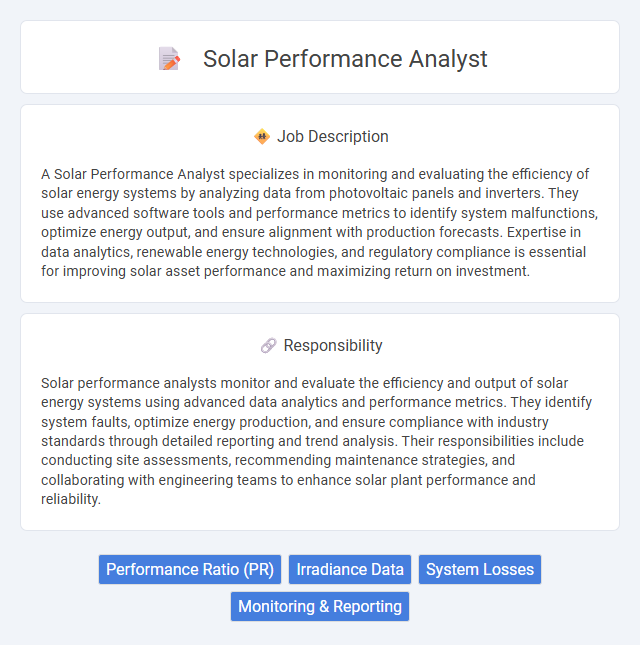
A Solar Performance Analyst specializes in monitoring and evaluating the efficiency of solar energy systems by analyzing data from photovoltaic panels and inverters. They use advanced software tools and performance metrics to identify system malfunctions, optimize energy output, and ensure alignment with production forecasts. Expertise in data analytics, renewable energy technologies, and regulatory compliance is essential for improving solar asset performance and maximizing return on investment.
Individuals with strong analytical skills and a passion for renewable energy are likely suitable for a Solar Performance Analyst role. Those comfortable working with data, interpreting technical reports, and optimizing solar energy systems may find this job aligns well with their abilities. Candidates who prefer routine, hands-on tasks without data analysis might struggle to thrive in this position.
Qualification
A Solar Performance Analyst must possess a strong background in renewable energy, with expertise in photovoltaic systems and performance monitoring software like PVsyst or SolarEdge. Proficiency in data analysis, including knowledge of Python, MATLAB, or similar tools, is essential to interpret solar production data and optimize system efficiency. Certifications such as NABCEP and a degree in Electrical Engineering or Environmental Science further strengthen the qualifications needed for this role.
Responsibility
Solar performance analysts monitor and evaluate the efficiency and output of solar energy systems using advanced data analytics and performance metrics. They identify system faults, optimize energy production, and ensure compliance with industry standards through detailed reporting and trend analysis. Their responsibilities include conducting site assessments, recommending maintenance strategies, and collaborating with engineering teams to enhance solar plant performance and reliability.
Benefit
A Solar Performance Analyst likely improves the efficiency and output of solar energy systems by analyzing data and identifying underperforming components. This role probably leads to significant cost savings and enhanced energy production, benefiting companies financially and environmentally. Employers may also find that having a dedicated analyst boosts system reliability and supports sustainable energy goals.
Challenge
A Solar Performance Analyst likely faces the challenge of accurately interpreting complex data sets from solar energy systems to predict efficiency and identify potential issues. There may be difficulties in adapting to rapidly evolving technology and integrating new analytical tools for optimal performance assessment. The pressure to deliver precise insights that drive cost-effective energy solutions could consistently test problem-solving skills and technical expertise.
Career Advancement
A Solar Performance Analyst plays a critical role in optimizing solar energy systems by analyzing data to improve efficiency and output. Mastery of advanced analytics software and a strong understanding of photovoltaic technology enable career progression into senior analyst roles or renewable energy project management. Continuous learning in emerging solar technologies and data science fosters opportunities for leadership positions within the renewable energy sector.
Key Terms
Performance Ratio (PR)
A Solar Performance Analyst specializes in evaluating the efficiency and effectiveness of photovoltaic systems by closely monitoring the Performance Ratio (PR), a key metric that measures actual energy output against theoretical energy production. Accurate PR analysis helps identify system losses due to shading, soiling, or equipment faults, enabling targeted maintenance and optimization strategies. Expertise in data acquisition systems, SCADA, and advanced analytics software is essential to maximizing solar asset profitability through continual PR improvement.
Irradiance Data
A Solar Performance Analyst specializes in evaluating the efficiency of solar energy systems by analyzing irradiance data, which measures solar radiation intensity crucial for predicting energy output. Accurate interpretation of irradiance data enables optimization of photovoltaic system performance and early detection of underperformance or faults. Expertise in data modeling, remote sensing, and meteorological data integration enhances the reliability of solar resource assessments.
System Losses
A Solar Performance Analyst specializes in monitoring and analyzing photovoltaic system losses to optimize energy output and improve efficiency. This role involves identifying factors such as shading, soiling, module degradation, inverter inefficiencies, and thermal losses that reduce overall system performance. Utilizing advanced data analytics and performance modeling software, the analyst provides actionable insights to maximize solar asset productivity and ensure accurate performance reporting.
Monitoring & Reporting
Solar performance analysts specialize in monitoring photovoltaic system outputs using advanced data acquisition tools and SCADA systems to track energy production and detect performance issues. They generate detailed reports analyzing efficiency trends, panel degradation, and environmental impacts, ensuring optimal system operations. Key metrics include energy yield, capacity factor, and availability, which guide maintenance strategies and operational improvements.
 kuljobs.com
kuljobs.com